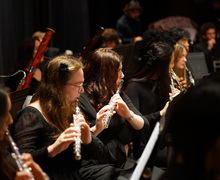A ‘cultural Yellow Pages’ directory could aid students of color
Avery Schildhaus | Contributing Photographer
If you were born before the 2000s, you may remember when telephone companies sent out Yellow and White Pages to your home with the listing of various contacts — White Pages for personal home phone numbers, and Yellow Pages for commercial businesses. Before this information was one Google search away, these directories made it somewhat easy to look up a business or someone’s name. New students of color at Syracuse University could use something like this — their own cultural Yellow Pages.
Unless you are one of the few students to have a connection to Syracuse prior to your arrival, it’s not always easy to know where to go for certain necessities. This is especially true for students of color with certain needs and wants that not just anyone can address.
One big issue for students of color is their hair. If you’re a young Black person on campus who wants or needs it done in a specific way, it can be difficult to find someone that can properly help.
Mazahar Kalia, an SU law student and a Syracuse native, said that when students learn of the co-owned business that she and her sister share, there is a sense of relief for those who find them.
“When they find another Black girl that can do hair, they’re just so ecstatic about it because it’s always difficult to try to find services in a town you’re not from,” Kalia said.
Kalia said that, when dealing with clients who are new students of color at SU, she does her best to provide them with as much information as possible, such as where to find a beauty supply store to tend to their hair.
“I’m kind of able to educate about the city of Syracuse, the ethnic part of it, rather than what is portrayed,” Kalia said.
Given that new students are adjusting to classes and the culture of the university, it is understandable that many students are not familiar with the city itself. However, that does not mean it is right to leave students culturally unaware of life outside of campus.
Thoughts of life outside of campus may only occur when the need to tend to things such as hair and food arise. Perception is key and, in some cases, it may appear as if ethnic culture in Syracuse does not exist. Kalia feels this perception is being confirmed by the most influential voices in town.
“The way Syracuse as the city is presented through Syracuse University is as this upstate New York school, predominantly white town,” Kalia said. “And that isn’t necessarily the case.”
“We have culture in the city of Syracuse, but because the campus is so big, and because it’s like in the middle of everything, it kind of takes away from the actual city and the ethnic part of it,” she said.
To edit the story of what the city of Syracuse is like beyond the campus of SU, a cultural toolkit — a book or website with information, services and resources helpful to students of color — should be created to better tell who represents Syracuse.
“Having a toolkit … for everything all Black women would want, or all Black men would want, having some sort of resource that the school provides, I think that students would benefit tremendously,” Kalia said. “Because it would be in the package, they wouldn’t have to search all on their own.”
Besides the issue of hair, transportation can also be an issue for some students in search of certain kinds of cultural foods that campus dining options may not provide. Kalia said that students frequently talk to her about the issue of transportation.
Students may use a variety of methods in their research, including social media. One hair stylist in Syracuse — Khadesia Tomlin, also known as Kay Kay — is known by students for using specific hashtags for certain hairstyles on Instagram.
However, even with the convenience of Instagram, Tomlin feels more could be done to make it easier for students of color to find what they need.
“The college kids should have some type of pamphlet or website like something that’s holding information of hairstylists, makeup artists and people who run their own business that they can attend,” she said.
Tomlin said that a cultural toolkit would provide SU students of color a new sense of power with the information it would hold. It would let them decide what is best for them, rather than being at the mercy of whatever services they just happen to find.
Tomlin also said that, for any type of database being curated, research should be done on each business. In her interactions with students, some have had bad experiences with hair stylists, who are not always reliable. She said it would be helpful if the toolkit included only recommended businesses to help students feel better about their choices of who to do business with.
SU students of color — both new and established students — flourish even more where they know who and where they can go without questions asked, and a cultural toolkit would help students of color find necessities that fit their needs. Whether this toolkit is created by the Office of Multicultural Affairs or another group on campus, SU administration and students should support and encourage the toolkit’s creation.
Camille Daniels is a 2020 SU alumna. She studied Magazine, Newspaper, and Online Journalism as a graduate student. You can reach her at cdaniels@syr.edu.
Published on August 29, 2021 at 10:35 pm






